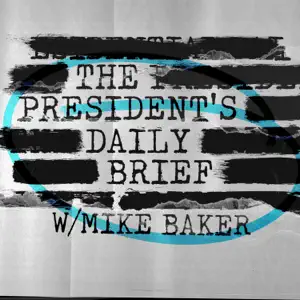
Time to end secret data laboratories—starting with the CDC
The American people are waking up to the fact that too many public health leaders have not always been straight with them. Despite housing treasure…
Thought Leader: Marty Makary

This piece is by WWSG exclusive thought leader, Niall Ferguson.
At home, the left sees him as cynical, conniving and corrupt; while the right sees him as tired, weak and unambitious. Abroad, he is almost universally loathed and distrusted. And yet no one can deny his Machiavellian mastery of the dirty game of politics, domestic and international.
Modern history has produced only two figures who fit this description. The first is Germany’s Iron Chancellor, Otto von Bismarck. The second is Israel’s Prime Minister, Benjamin Netanyahu. For Bibi – his nickname and the title of his recent autobiography – read Bibismarck.
Netanyahu has been Prime Minister for almost 14 of the past 15 years, not quite the 19 years Bismarck served as German chancellor. For nearly a decade, whether Bibi should stay or go was the central question of Israeli politics. Between 2018 and 2022, Israel held five elections in which one of the rallying cries of the opposition was ‘Just not Bibi’.
In August last year, Israel was racked by anti-Netanyahu protests that drew hundreds of thousands to the streets, including almost every member of the country’s cultural and even military elite. The surprise attack of 7 October was seemingly the final nail in Netanyahu’s political coffin.
And no wonder. Hamas has largely been vanquished in Gaza, its remaining fighters confined to tunnels under a heap of rubble. More impressively, Israel has conducted arguably the most successful clandestine operation of the 21st century, maiming around 3,000 Hezbollah operatives with explosive pagers. And it is waging a war in all but name in Lebanon, attacking more than 5,000 targets in the past month and eliminating 16 of Hezbollah’s most senior operatives.
Last week, Bibi was at the UN General Assembly, defiantly quoting the Prophet Samuel: ‘The eternity of Israel will not falter.’ Half an hour after he stepped down from the podium, from his hotel on Manhattan’s Upper East Side, he ordered the killing of Hassan Nasrallah, the seemingly invincible secretary-general of Hezbollah. On Monday, Netanyahu went even further. In a video addressing the Iranian people, he hinted that Iran ‘will be free sooner than people think’.
At the time of writing, Iran has launched more than 180 ballistic missiles at Israel. Judging by his recent performance, Netanyahu may seize the opportunity to hit the Iranian ‘octopus’ over the head, seeking to topple the theocracy in Tehran, or at least to strike a blow against its nuclear weapons programme.
When we met with Netanyahu in Jerusalem in February, we were struck by his Bismarckian demeanour. Throughout our conversation, he kept glancing sideways to a map of the Middle East that hangs on his office wall, as if to remind himself of his country’s predicament. Bismarck famously said that his map of Africa was a map of Europe. Bibi’s map of the world is a map of Israel, tiny and surrounded by foes.
Asked what a future historian in 20 or 30 years’ time might think about him, he replied: ‘The United States was declining. But Israel was able to resist the regional ambitions of Iran by defeating or containing the tentacles of the octopus.’ He added that in pursuing this objective, he always took care to avoid antagonising ‘superpowers’, meaning Russia and China.
The future historian may add that, by focusing relentlessly on the Iranian threat, Netanyahu succeeded in building bridges to the Arab states, including those in the Gulf, while at the same time marginalising the Palestinians. The Abraham Accords were the result not of idealism but of vintage Realpolitik. In pursuit of his goals, Netanyahu has worked with Russia in Syria, enabled Hamas in Gaza, and defied first Barack Obama and then Joe Biden in Washington.
Moreover, like Bismarck, Bibi has combined devious foreign policy with devious domestic politics. He took the soft-left Yair Lapid as his finance minister, the hard-right Itamar Ben-Gvir as his national security minister and rallied the conservative masses against the liberal bourgeoisie with the lightning rod of judicial reform, repeatedly dividing the nation to secure his own political position.
Bismarck instrumentalised German unification to defend the Prussian monarchy and aristocracy against the threat posed to them by bourgeois liberalism. He built the German Reich with a series of short, sharp wars: against Denmark, against Austria and against France. Having founded the Reich, he never lost sight of Germany’s vulnerable position between France and Russia.
He devised the intricate diplomatic instrument of the Secret Reinsurance Treaty to avoid being dragged into a fight with Russia on Austria-Hungary’s behalf. All this could be sustained domestically only with a series of artful measures to divide the liberals, exploiting their anti-Catholicism and anti-socialism, as well as the susceptibility of the industrialists to the temptation of tariffs.
Yet, for all the resemblances, Netanyahu seems to be reliving Bismarck’s career in reverse. In 1874, 16 years before being forced out of office, Bismarck complained: ‘I am bored. The great things are done.’ After close to the same amount of time in office, Netanyahu has never been less bored, for he now has the chance to do the great things. The decapitation of Hezbollah may be his Königgrätz, the battle in 1866 which confirmed Prussian primacy over Austria. Destroying the Iranian nuclear programme – or the regime itself – would be his Sedan, the battle that doomed the Second French Empire of Napoleon III.
In Krav Maga, Israel’s national martial art, breaking out of a headlock requires striking the opponent in the head with a free hand, disorienting them, then going on the offensive. This metaphor describes many episodes in Israeli military history. In 1955, Operation Elkayam killed 72 Egyptian soldiers in retaliation for the Fedayeen insurgency, humiliating Egypt into a ceasefire.
In 1967, Israel launched the Six-Day War as a response to Egypt’s closure of the Straits of Tiran. In 1978, Israel launched Operation Litani to end PLO raids in northern Israel. Israel’s headlock, before and after 7 October, was obvious. Iranian proxies – Hamas, Hezbollah, the Houthis, Palestinian Islamic Jihad – threatened it from multiple sides. We now have a sense of how Netanyahu seeks to emerge from it.
Launching a new war in Lebanon gave Israel three options. The first was to trigger an Iranian response, which would yield an opportunity to strike either the Iranian nuclear programme or the stability of the regime itself. The second, had that not materialised, was to hit Hezbollah so hard that Iran weighed in to try to push Hamas into a ceasefire on Israel’s terms. The third was to pre-empt a harsh reaction by a weakened Hezbollah, which would have given Israel the opportunity to effect lasting strategic change north of its border.
As with all Bismarckian stratagems, there were many risks involved. It seems unlikely that the Hamas chief, Yahya Sinwar, if he is still alive, will be more likely to agree a ceasefire now, as Hamas does not depend on Iranian supplies, and a larger war might even save it from perdition. And an all-out Lebanon War would absorb Israel’s capabilities, giving Iran a window to sprint to a bomb.
Bismarck saw five fronts in his famous ‘combinations’ (Austria, Britain, France, Russia, Italy). Netanyahu has to think about more than seven (Gaza, the West Bank, Syria, Lebanon, Iraq, Yemen and Iran – to say nothing of Turkey, Egypt and the Gulf states). The coming days, more than any other period in his career, will determine Netanyahu’s place in history. As the son of an historian – his father Ben-Zion wrote The Origins of the Inquisition in Fifteenth Century Spain – Bibi is no doubt aware of that.
Perhaps the most profound similarity between the Iron Chancellor and the Iron Prime Minister is the way they look at history. Survival is more important than ideology, a principle that extends as much to one’s own political career as to the life of the state. Bismarck was born in 1815. His political career tracks the rise and fall of the great powers’ Congress System. Netanyahu was born in 1949. His political career tracks the rise and fall of the Pax Americana.
After living through the revolutions of 1848, Bismarck concluded that the advance of modernity was unstoppable. Netanyahu’s father taught him that Jewish history is a ‘history of Holocausts’. The conservativism of the two men is perhaps rooted in this essential pessimism. Netanyahu, unlike his settler allies, can all too easily imagine a world in which Israel no longer exists. Unlike his opponents on the left, he cannot imagine a utopian end of history. Like Bismarck’s, then, his is a vision of perpetual struggle.
The key question for Israel is what follows Netanyahu. Henry Kissinger’s critique of Bismarck was that it is impossible to institutionalise a multi-year tour de force. The same may be said of Bibi. He has no obvious successor, and that is by design. The Israeli political landscape is littered with protégés turned enemies: former prime minister Naftali Bennett, former defence minister Avigdor Lieberman, former defence minister Moshe Yaalon and former justice minister Gideon Sa’ar (though Netanyahu managed to coax him back into the cabinet last week).
Netanyahu’s view that there is no one up to the task may be true. But after Bismarck came Caprivi. And eventually came Bethmann-Hollweg, the chancellor whose miscalculations plunged Europe into war in 1914. Netanyahu’s most likely successors in the Likud party are avowed populists without his historical sensibility or facility with the English language. He thus bequeaths his country as uncertain a future as Bismarck left to his. Bismarck unified Germany but failed to unite the Germans. His successors embarked on a road that led to war and the dissolution of the Reich.
To be the Israeli Bismarck is no mean feat. But there may be a sting in Bibi’s tale.
Time to end secret data laboratories—starting with the CDC
The American people are waking up to the fact that too many public health leaders have not always been straight with them. Despite housing treasure…
Thought Leader: Marty Makary
David Frum: How Harris Roped a Dope
This piece is by WWSG exclusive thought leader, David Frum. Vice President Kamala Harris walked onto the ABC News debate stage with a mission: trigger…
Thought Leader: David Frum
Michael Baker: Ukraine’s Faltering Front, Polish Sabotage Foiled, & Trump vs. Kamala
In this episode of The President’s Daily Brief with Mike Baker: We examine Russia’s ongoing push in eastern Ukraine. While Ukrainian forces continue their offensive…
Thought Leader: Mike Baker

